Verjuice is a type of juice that is made from sour fruit like crab apples or unripe grapes. It is a useful ingredient to keep in the fridge, and excellent for adding lightly sour, acidic flavor to food. Marinades, dressings, soups, salads, and other recipes that benefit from a little acidity are a perfect match for verjuice.
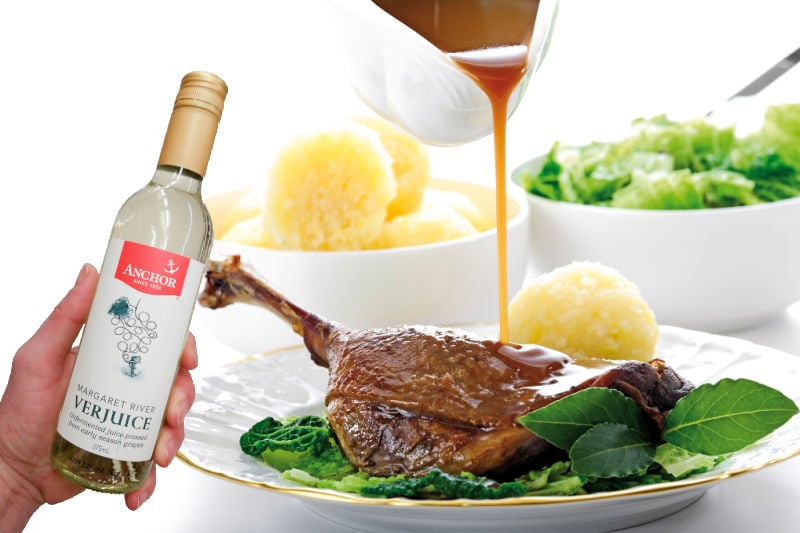
Finding verjuice can be a challenge in some countries and buying a whole bottle for one recipe may be overkill. The good news is, there are plenty of suitable verjuice substitutes that you can use in cooking. They won't perfectly mimic the flavor, but in most cases, the difference will be barely noticeable.
Table of Contents
What can I use as a substitute for verjuice?
To replace verjuice in a recipe your best options are white wine vinegar, apple cider vinegar, lemon juice, or citric acid.
1. White Wine Vinegar

For a low-cost alternative, we recommend white wine vinegar in recipes where the food gets cooked. You'll find that vinegar is a little harsher than verjuice, but most of the sourness will get cooked off.
To get the best out of your recipe, choose high-quality white wine vinegar. This can have a big impact on your dish and the difference between cheap and premium vinegar is usually only a couple of dollars.
Verjuice has a sweeter flavor profile than white wine vinegar so you may want to add a little extra sweetness. Sugar, honey, or even orange juice may be suitable depending on what you're cooking.
Verjuice is a popular ingredient for making mustard. If you're looking to substitute verjuice for this reason, then white wine vinegar works fine.
2. Apple Cider Vinegar
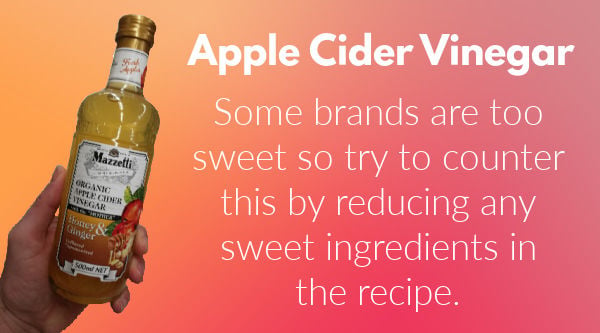
Apple cider vinegar has a sweet and tart flavor profile. If verjuice is in your local store you’ll usually find apple cider vinegar positioned next to it as they have similar uses in the kitchen.
Keep in mind that cider vinegar won’t closely match the complex flavor profile you get from verjuice, but it won't be out of place in many recipes.
3. Lemon Juice
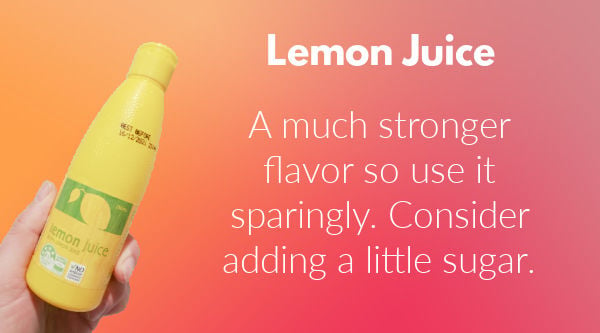
Lemon juice is an easy-to-find replacement for verjuice that will work if you are in a pinch. It is another option that is best used in cooked recipes, where the harsh sourness is pacified a little.
Verjuice has a more complex flavor profile than lemon juice and is also a more subtle ingredient. For this reason, try to avoid using lemon juice to flavor dressings and other uncooked dishes. And if you must use it, use moderation or you will overpower the food with sourness.
4. Vermouth

Vermouth is an excellent cooking wine, adding mouth-watering aroma and flavor. When recipes call for verjuice to deglaze a pan, vermouth will happily step in as a handy backup option.
To make this alternative work, we suggest using it sparingly in your recipes to avoid overwhelming the dish. You'll also need to allow sufficient cooking time to ensure the alcohol is cooked off.
Use sweet vermouth to replace red verjuice and dry vermouth to replace white verjuice.
Note: Brandy is also a delicious option for deglazing a pan. Naturally, it will add additional sweetness and flavor that you won't get from verjuice, but this isn't necessarily bad. Splashed into a roasting dish with leftover bits of beef, lamb, or fish will result in a rich, flavorsome sauce.
5. Mirin
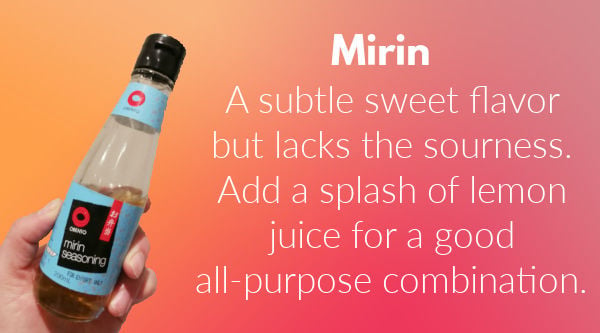
Mirin is a Japanese rice wine that has a similar sweetness and subtle tang to verjuice. We would happily use a splash of this in most cooked dishes that call for verjuice.
Related reading: Be sure to check out our article which compares mirin and rice vinegar.
6. White Wine

Like verjuice, white wine is extracted from grapes. The main difference is that the fermentation process gives it a stronger taste of alcohol. If you decide to use white wine, choose a bottle that is astringent and tart.
Avoid white wine that has been given plenty of time to mature. If you aren't a wine buff, then have a chat with the salesperson at your local bottle store to see what they suggest.
7. White Vinegar
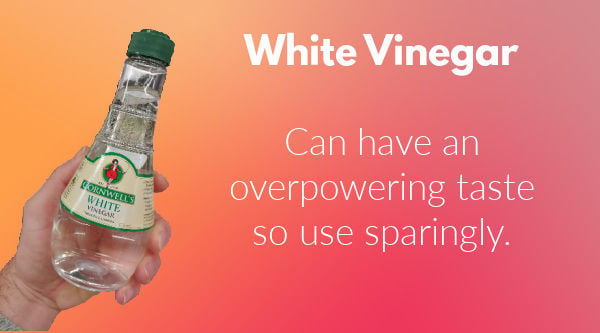
If you have premium white vinegar in the cupboard then it can be used to replace verjuice. Even the best vinegar will still have a harsher flavor so use this alternative in moderation. You may also want to add a sprinkle of sugar to get those sweet notes.
8. Citric Acid
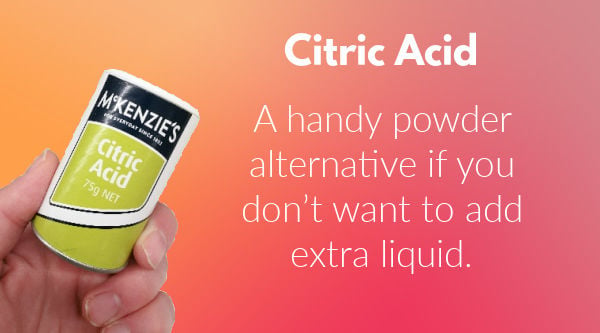
A huge range of commercial food products uses citric acid as a preservative or flavor enhancer. This white powder is excellent for balancing dishes thanks to its acidic, sour taste. It is a useful method for adding brightness to food without needing to add liquid. In most cases, you'll only need a quarter two half a teaspoon of citric acid as a verjuice substitute.
9. Homemade Verjuice

Although there are a range of replacement options if you don't have verjuice, making your own is the most authentic choice. You need a lot of unripe grapes so it’s a great option if you have a grave vine at home.
Makes: 1 quart.
Ingredients
- 5 pounds of unripe grapes
Method
- Wash the grapes and remove their stems.
- Using a food mill, choose a coarse plate and process the fruit until you get a juicy pulp. A few seeds are okay.
- Using latex gloves, squeeze the great pulp into a sieve that's placed over a bowl. Pour the resulting juice through a coffee filter to remove any leftover sediment. You may need to use more than one filter as they can get clogged up.
- Pour the juice into a jar and then add a half teaspoon of citric acid.
Store the verjuice refrigerated for up to six months.
A quick tip: Lightly wet the coffee filters before using them so that they don't absorb as much juice.
Summary of Verjuice Alternatives
| Substitute | Comments |
|---|---|
| White wine vinegar | Our preferred alternative and excellent for replacing verjuice in mustard recipes. Choose a quality bottle that isn’t harsh. |
| Apple cider vinegar | Some brands are too sweet so try to counter this by reducing any sweet ingredients in the recipe. |
| Lemon juice | A much stronger flavor so use it sparingly. Consider adding a little sugar. |
| Vermouth | Excellent for pan deglazing. |
| Mirin | A subtle sweet flavor but lacks the sourness. Add a splash of lemon juice for a good all-purpose combination. |
| Citric acid | A handy powder alternative if you don’t want to add extra liquid. |
| White vinegar | Can have an overpowering taste so use sparingly. |
| White wine | Choose an astringent dry bottle with low sweetness. |
| Homemade verjuice | The best replacement, but you’ll need access to unripe grapes. |
What are the best uses for verjuice in cooking?
Verjuice can be used in many recipes that call for lemon juice, lime juice, or vinegar. It is delicious when added to marinades, dressings, salads, or any dish that benefits from acidity. It is great for drizzling over grilled fish, fresh oysters, or char-grilled baby octopus.
Where can I buy verjuice?
In some parts of the world, you'll find that verjuice is easy to find in supermarkets. The Maggie Beer brand is easily found in Australia. in the United States, if you're having trouble finding any, try Middle Eastern grocery stores. If all else fails, you can easily search for verjuice online.
Fast facts
- Verjuice has been used in Middle Eastern and European cuisine for centuries.
- As there is no fermentation when making verjuice, it is a non-alcoholic ingredient.
- Verjuice is also called verjus in French and translates to “green juice”.
- How to store verjuice
- Verjuice is usually sold in a bottle and can be stored in the refrigerator for up to two months. It can also be frozen in ice cube trays for up to six months.
Summing Up
Although verjuice has been around since the Middle Ages, it has only recently started appearing in modern cookbooks. If you're making a recipe that goes for veggies and you don't have any, we suggest using another liquid that has acidity and sourness instead. Some common ingredients that work well are white wine vinegar, apple cider, or lemon juice.
Keep in mind that verjuice adds acidity without the harsh sourness or bitterness that comes from some other liquids. To keep your meal in balance, try adding half the amount of the substitute and then taste test. You can always add more if food needs it. It's much more difficult to fix sour sauce from too much lemon juice.

Leave a Reply